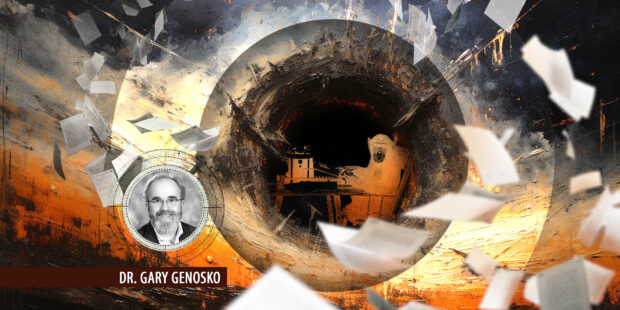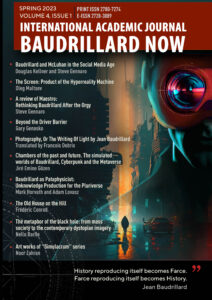
Implosion Today
by Dr. Gary Genosko
But nothing will halt the implosive process, and the only remaining alternative is between a violent and catastrophic implosion, and a smooth implosion, an implosion in slow motion.
—Jean Baudrillard, In the Shadow of the Silent Majorities
Implosion was coined by Canadian media theorist Marshall McLuhan in the 1960s to describe a technological tendency of information flow, accelerated communication, and networked integration. Implosion is contrasted with explosion, an earlier condition of print culture. The demands of constant intimacy and instantaneity are exacerbated under the influence of electric infrastructure and then emergent electronic media. Similar ideas of influential precursor economic historian Harold Innis are considered, along with Paul Virilio’s interpretation of the concept as inertial. Finally, Virilio provides a bridge between the medium theorists (Innis and McLuhan) and Baudrillard; it is in the latter’s sense of implosion as a catastrophe of meaning that the concept becomes for us today a process of pure fascination.
What is implosion?
Implosion is a technological tendency of information flow supported by increases in the speed of communication and degree of a historical period’s electric and later electronic networked integration. Articulated by McLuhan in Understanding Media (1964), it describes a centripetal movement inward in opposition to an explosive or centrifugal explosion outward. The purpose of this dichotomy is to overcome the following outdated distinction: the uneven geographic distinction between center and margin. McLuhan believed that in the electric age no place is marginal any longer. McLuhan’s imploded world was a global village that displayed features of organic wholeness in a “total field of inclusive awareness” (1964: 104).
Margins are erased as centers proliferate under implosive conditions. Nowhere is marginal under highly networked maximal speeds of information circulation. Whether centers are everywhere also means that margins are nowhere and are no longer accounted for as political realities in terms of the power of colonialism, control of knowledge’s flows, and even ownership of digital infrastructure by telephone companies and governments.
Electric implosion displaces mechanical explosion. McLuhan opposed visual and acoustic spaces. Visual space is a perspectival, sight-centered, fragmenting, homogenizing and bounded, the kind of perceptual universe based on mechanical and linear print. Whereas acoustic space is dynamically multi-sensorial, highly involving, post-literate, simultaneous, discontinuous, and intuitive. It is reawakened by electric technologies under implosive conditions.
Innis distinguished between media biases through either space-binding properties, the lightness and portability of paper, or time-binding properties, such as stone’s durability and links to the sacred and tradition. The space-territory/time-tradition distinction had specific effects in different eras on social organization, the former invalidating the latter by delegitimizing tradition for the sake of technocentric values of immediacy and speed.
Media that emphasize space were for Innis explosive insofar as they encouraged the expansion of administration and trade, whereas time-based media were heavy, situated in a relatively inflexible and static space, embedded in specific architectures and in collective symbolic practices. In 1951, Innis wrote a “Plea for Time” against his culture’s space-media bias so as to regain a balance that left unchecked sowed the seeds of instability and strife. McLuhan also sought to regain the values of time-based media, in presenting a newly minted version of what ‘second’ oral societies would look like in the electric age: a deeply participatory and interactive, contracted global village. McLuhan’s Catholic humanist plea went beyond secular time into the realm of Pentecostal oneness and the sempiternal glance of angels as its transcendent reference point for instantaneous communication.
Implosion implies an intensive kind of awareness that arises from the friction created by pulling out distances and delays between components. Speed forces a reversal of explosion into implosion, and in this contraction the older form of expansionism is not erased, but persists as an irritant, an obsolesced form that nostalgists will find interesting (i.e., acceleration at the speeds of roads and railways). Both space and time are by-passed; McLuhan considered them to be “interfused.”. In this condition, there are no buffers and thus human association and its machine accompaniments, are disrupted in being put under the pressure of a constant, forced communication. Inclusivity creates problems.
The implications of implosion for chronopolitics have been analyzed by Paul Virilio in Speed and Politics (1986). An intensive temporality arises from the contractions of transportation, inertial vehicularity, the ascendancy of the arrival over the departure, and the juxtaposition of every place. Implosion threatens time for reflection, and thus the last war will be waged over automated decision-making with cataclysmic instantaneous results.
 Unlike McLuhan, for Virilio, war, not love, is the result of an imploded world. Interfusion and inter-association do not improve the situation as McLuhan believed. For Baudrillard, meaning implodes the distinctions between sender and receiver and media and the real, leaving only fascination with its collapse. Implosion in this sense is closer to it physical manifestation in the demolition of buildings. When this concept is applied to the inner collapse, as in the implosion of meaning in the masses, meaning is engulfed and annihilated. In this sense implosion is an abyss, it displays black hole effects like gravitational attraction that ensures that light cannot manage to fully escape it, and hangs on the hole’s boundary, as Stephen Hawking (1988: 100) put it in A Brief History of Time, “like the edge of a shadow – the shadow of impending doom.” What is important for Baudrillard in this scenario is the neutralization of meaning, that is, of content, in favour of the medium which acts as “spectacle and fascination.” (1983: 35) Fascination with the glaciation of meaning in the medium, Baudrillard thinks, is the destiny of implosion, and it may be seen today in the doom loops of ecosystem, economy, social media, collapse. Preference for the medium over the message allows fascination not only to function but to flourish like “allergies”: the “implosion of the sign in fascination” (1983: 36) is intolerable for the hermeneut desperate for meaning, for the politician who wants to inspire the masses to act; for the sociologist who wants to protect the meaning of the social but also derive something from it.
Unlike McLuhan, for Virilio, war, not love, is the result of an imploded world. Interfusion and inter-association do not improve the situation as McLuhan believed. For Baudrillard, meaning implodes the distinctions between sender and receiver and media and the real, leaving only fascination with its collapse. Implosion in this sense is closer to it physical manifestation in the demolition of buildings. When this concept is applied to the inner collapse, as in the implosion of meaning in the masses, meaning is engulfed and annihilated. In this sense implosion is an abyss, it displays black hole effects like gravitational attraction that ensures that light cannot manage to fully escape it, and hangs on the hole’s boundary, as Stephen Hawking (1988: 100) put it in A Brief History of Time, “like the edge of a shadow – the shadow of impending doom.” What is important for Baudrillard in this scenario is the neutralization of meaning, that is, of content, in favour of the medium which acts as “spectacle and fascination.” (1983: 35) Fascination with the glaciation of meaning in the medium, Baudrillard thinks, is the destiny of implosion, and it may be seen today in the doom loops of ecosystem, economy, social media, collapse. Preference for the medium over the message allows fascination not only to function but to flourish like “allergies”: the “implosion of the sign in fascination” (1983: 36) is intolerable for the hermeneut desperate for meaning, for the politician who wants to inspire the masses to act; for the sociologist who wants to protect the meaning of the social but also derive something from it.
Baudrillard thought of media in terms of the implosion of meaning and representation. He retains from McLuhan one important feature: that implosion as a dominant feature of our networked world follows from centuries of explosion, and is as a result always a “failure.” Just as McLuhan looked to oral, pre-literate societies for a model of electric togetherness, Baudrillard, too, finds in “traditional” societies based around ritual processes a model for a non-catastrophic or what he calls “controlled implosion” (1983: 59). This idea exists because of the sustaining “tension” that fends off the appearance of a destructive explosive process. Similarly, in modern societies, survival hinges on the slow and steady explosive release of the energy (liberation, boom and bust cycles, acceleration); once this becomes uncontrollable, the knowledge of how to “curb and equilibrate” it becomes lost, it reverts to a catastrophic implosion (1983: 60). The introduction of a controlled implosion (and explosion) adds a nuance to these processes that are missing in McLuhan’s account, and conceptually this approach echoes Félix Guattari’s sense of experiments in the production of new kinds of subjectivities based on controlled chaoticisation (through the use of drugs, for instance) that danced round the rims of dangerous black holes, in the manner of light described by Hawking above. Is this a recipe for doom? How the question of control is answered is key, for it will either forestall or facilitate implosion. If, for Baudrillard implosion is inevitable, then the loss of control occurs no matter how carefully one attributes – and his target here is Guattari (and Deleuze) – to molecular elements of desire a capacity to ignite the release of energy in a massive explosion. But what kind of implosion? As a process it is inevitable, Baudrillard maintains (1983: 61), but it may be happening in “slow motion,” even though transitions between explosion and implosion tend to be violent and catastrophic.
Today, this is our reality. We are in a slow-motion implosion of climate change, with some consequences occurring faster than others, and emission reductions, alternatives to fossil-fuels, various resilience initiatives, for instance, introducing an element of “control” in the worst-case scenarios. This forestalling of the inevitable is a process of smoothing, Baudrillard tells us, that makes, say, drought less deep; entails building climate smart infrastructure, averting crisis by various reductions, low-costs solutions, and a turn to renewables. From this perspective, every solution simply forestalls the inevitable, as the world lurches between the entrenched denialists and the instant gurus of sustainability.
References
Baudrillard, Jean. (1983) In the Shadow of the Silent Majorities. New York: Semiotext(e).
Hawking, Stephen (1988) A Brief History of Time: From the Big Bang to Black Holes, New York: Bantam.
Innis, H. (1951) A Plea for Time. In The Bias of Communication. University of Toronto, pp. 61-91.
McLuhan, M. (1964) Understanding Media: The Extension of Man. McGraw-Hill, New York.
Virilio, P. (1986) Speed and Politics, trans. M. Polizzotti. Semiotext(e), New York.


